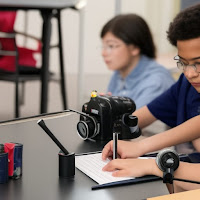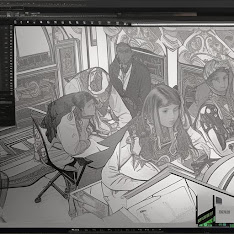As
the arrival of ChatGPT has opened up new possibilities for students to complete
written assignments, universities must carefully consider how to approach this
new tool in their policies. This careful consideration is even more important
for universities where the students are not native speakers of English, where
linguistic proficiency is part of the evaluation of student performance. There
are several options available, each with its own advantages and drawbacks, but my preference is some forward-looking option.
NightCafé Studio 02/03/2023
One
option is to ban the use of ChatGPT and to implement severe punishments for any
students caught using it. This a choice made by a few educational institutions
worldwide, and the advantage is that this is clear and simple. However, this
approach may not be practical, as it may be difficult to monitor the use of
this tool effectively, even if there have been tools developed to spot the use
of ChatGPT. Moreover, some students may still find ways to use ChatGPT
discreetly, making it difficult to enforce such a policy effectively.
 |
| NightCafé Studio 02/03/2023 |
Another
option is to do nothing and to treat ChatGPT as a tool similar to spell,
grammar, and style checkers. If students can use the latter tools, why not let
them deploy a somewhat more advanced tool as well. While this approach may seem
reasonable at first glance, it raises several issues. For one, it makes it
challenging to evaluate the student's actual writing ability, especially in the
case of non-native speakers of English. Moreover, ChatGPT's ability to produce
perfectly written papers may be a threat to academic integrity, as it could be
difficult to differentiate between work produced by students and that produced
by AI. Thus, when it comes to evaluation, it is difficult to tell who is evaluated.
 |
| NightCafé Studio 02/03/2023 |
A
more forward-thinking approach may be to teach students how to use ChatGPT
effectively, responsibly, and more importantly critically, recognizing that
AI-generated texts may well be the way of the future. This approach may involve
revising the evaluation of written assignments to take into account the use of
AI tools, emphasizing the importance of critical thinking and the ability to
integrate information from multiple sources in the writing process. It may also
involve teaching students how to evaluate the reliability and accuracy of
information generated by AI. And when the students’ linguistic abilities
are to
be evaluated, the in-class methodology can be used. So teaching the responsible
use of ChatGPT and revising the evaluation methodology go hand in hand.
NightCafé Studio 02/03/2023
Whatever
the chosen approach, universities must also consider what to do with students
who choose not to use ChatGPT. This is even more so, if students’ choice is
motivated by the lack of technological resources. Instructors must make it
clear that students have a choice in how they complete their assignments, but
that they will be evaluated on the quality of their work, regardless of the
tools they use. But again, the quality of the product may well depend on the
students financial background or technological interests, so the avoidance of deepening the digital divide should be in the focus of our attention.
In
conclusion, the arrival of ChatGPT presents both opportunities and challenges
for universities in their approach to written assignments. While it may be
tempting to ban the use of this tool, it is essential to recognize its
potential benefits and to find ways to integrate it effectively into the
learning process. This requires careful consideration of the implications of
AI-generated texts and the development of policies that promote responsible use
of this technology. What would be your choice?
No comments:
Post a Comment